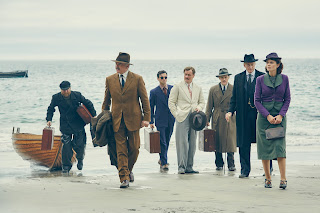“Adapting AGATHA
CHRISTIE”
Ever
since the release of the BBC recent adaptation of Agatha Christie’s 1939 novel,
“And Then There Were None”,
television viewers and critics have been praising the production for being a
faithful adaptation. In fact these
critics and fans have been in such rapture over the production that some of
them have failed to noticed that the three-part miniseries was not completely
faithful. As long as the production
followed Christie’s original ending, they were satisfied.
Mind
you, I thought this new production, “AND
THEN THERE WERE NONE” was top notch,
I have found myself growing somewhat annoyed over this attitude. Why do so many people insist that a
movie/television production should be faithful to the novel it is
adapting? I honestly believe that it
should not matter. Not really. I believe that sometimes, it's a good thing
to make some changes from the original novel (or play). Sometimes, it's good to remain faithful to
the source novel. Sometimes, what is in
a novel does not translate well to the television or movie screen.
A
good example are the two adaptations of Christie’s 1941 novel, “Evil Under the Sun”. The 1982 adaptation, which starred Peter
Ustinov as Hercule Poirot, made some major changes in regard to characters and
a minor subplot. The 2001 television
adaptation, which starred David Suchet, was somewhat more faithful . . . but
not completely. In my personal view, I
believe that the Ustinov version was a lot better . . . more entertaining. Why?
If I have to be brutally honest, I am not a big fan of Christie’s 1941
novel. No matter how many times I tried
to like it (and I tried), it simply bored me.
In
regard to the adaptations of "And
Then There Were None", there are only two adaptations that I really
enjoyed - Rene Clair's 1945 adaptation and this new version. The 1945 film is actually an adaptation of
the 1943 stage play written by Christie.
Because the play first opened in the middle of World War II, Christie
had decided to change the ending in order to spare wartime theater goers the
story’s nihilistic ending. Two years
later, director Rene Clair and 20th Century Fox decided to adapt
Christie’s stage play, instead of the novel.
Several other movie adaptations – including the 1996 and the 1974 – did
the same. As far as I know, only the
Russian 1987 adaptation followed Christie’s original ending.
And
how do I care about these numerous adaptations?
I have seen both the 1966 and 1974 movies. I am not a fan of either. Personally, I found them rather cheap. I have never seen the 1987 Russian film. As for the 1945 and 2015 versions . . . I am
a big fan of both. That’s right . . . both
of them. I do not care that 2015
miniseries stuck to Christie's original novel, despite some changes, and
Clair’s 1945 movie did not. I simply
happen to enjoy BOTH versions. Why? Both versions were made with skill and
style. And I found both versions
fascinating, despite the fact that they have different endings.
I
do not believe it should matter that a movie or television ALWAYS adhere to the novel it is adapting. What should matter is whether the director, writer
or both are wise enough to realize whether it is a good idea to be completely
faithful or to make changes . . . for the sake of the production. If producer John Bradbourne and director Guy
Hamilton can make a superior adaptation of “Evil
Under the Sun” by utilizing major changes to Christie’s original story and
if there can be two outstanding versions of “AND THEN THERE WERE NONE” . . . with different endings, I really do not see the need for any film or
television production to blindly adhere to every aspect of a novel it is
adapting.





